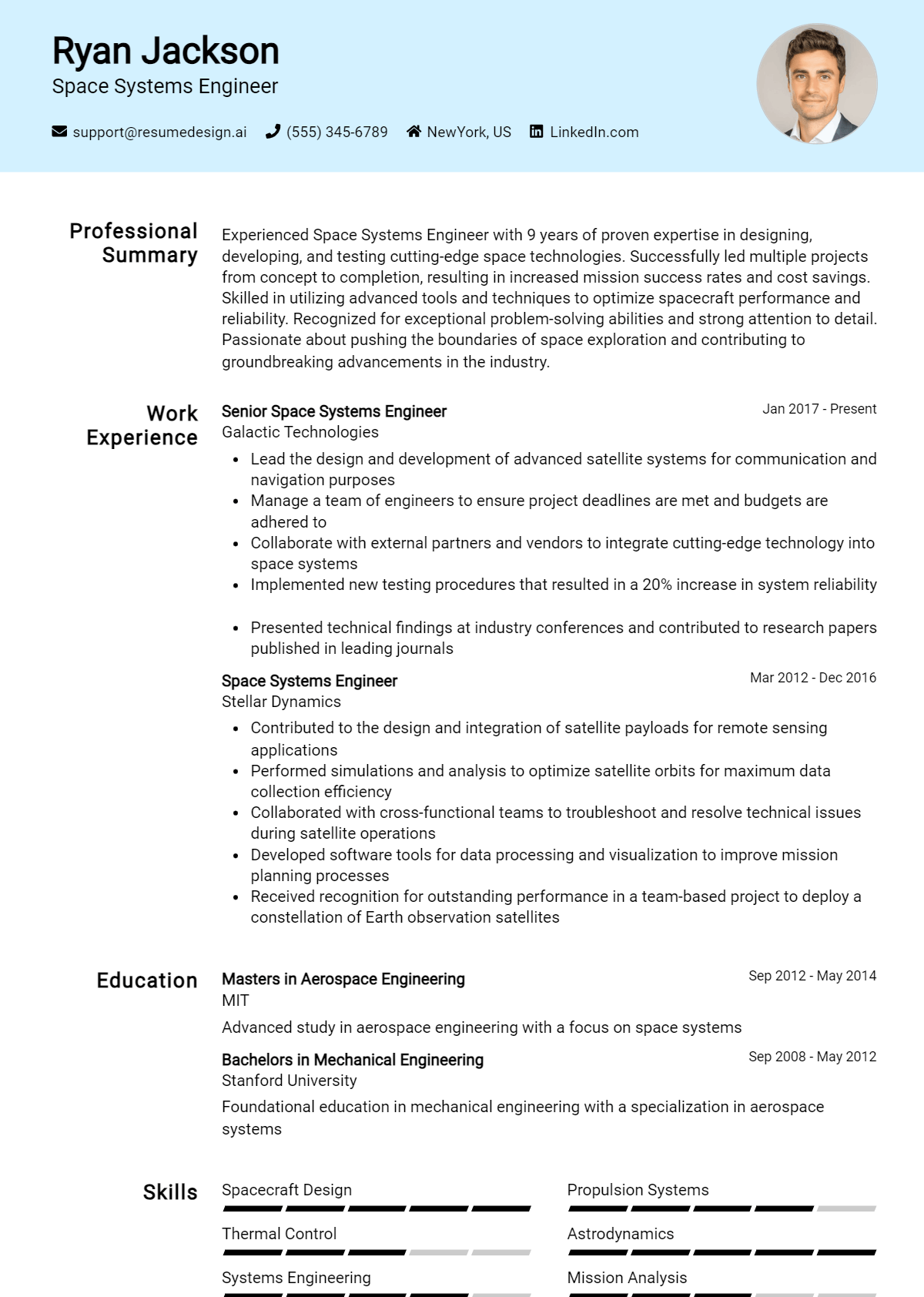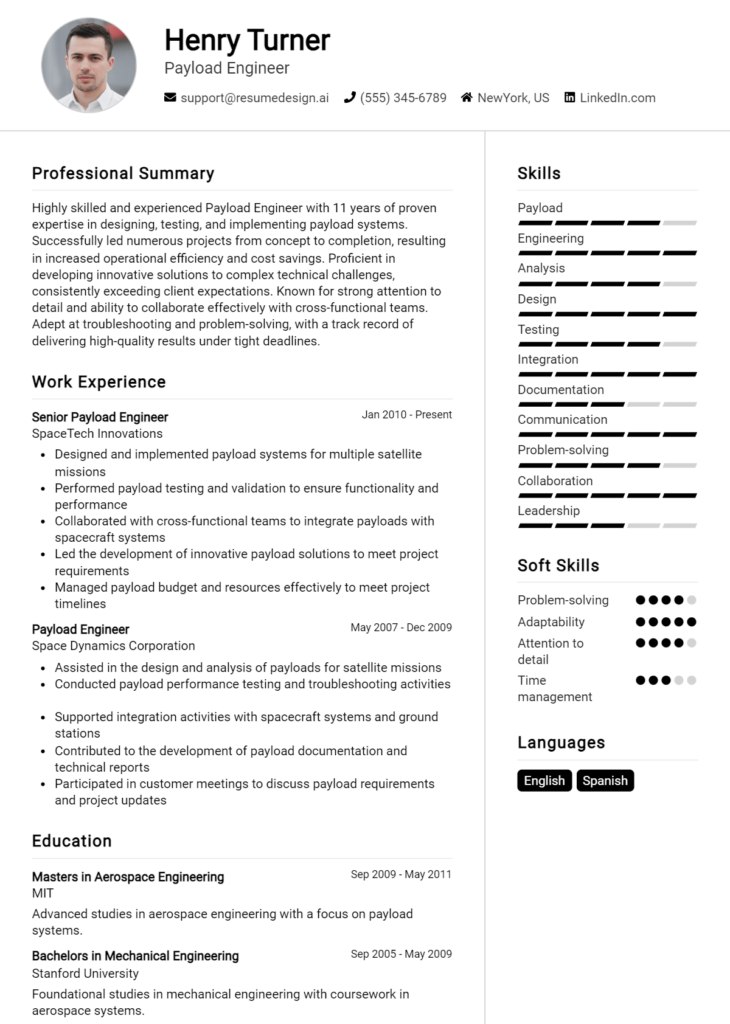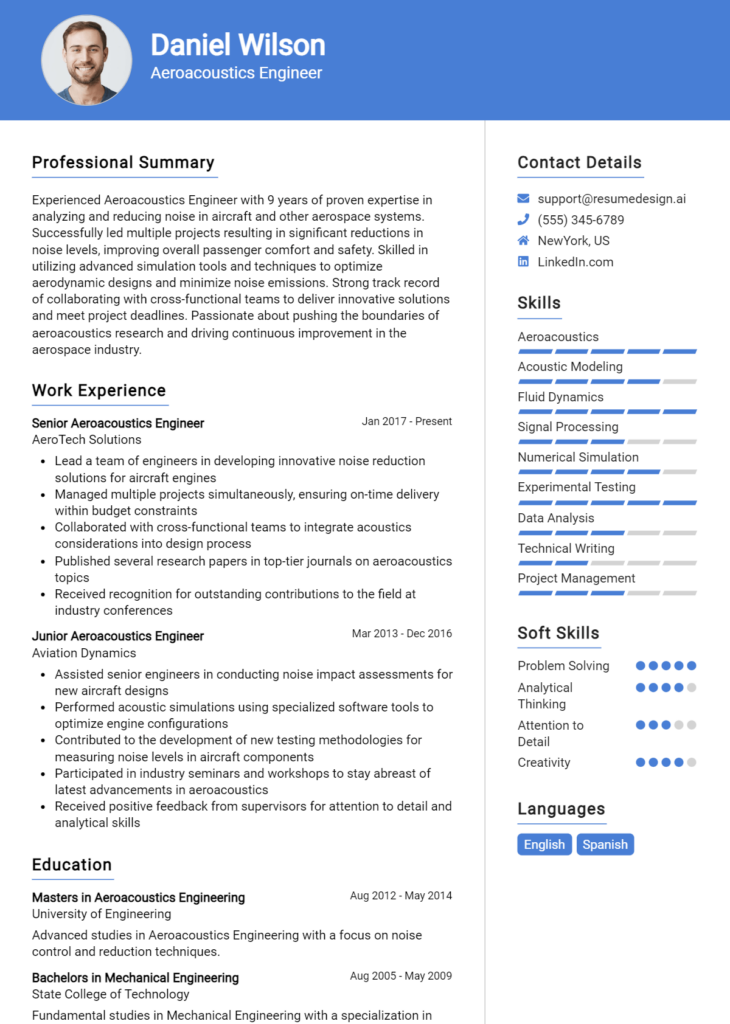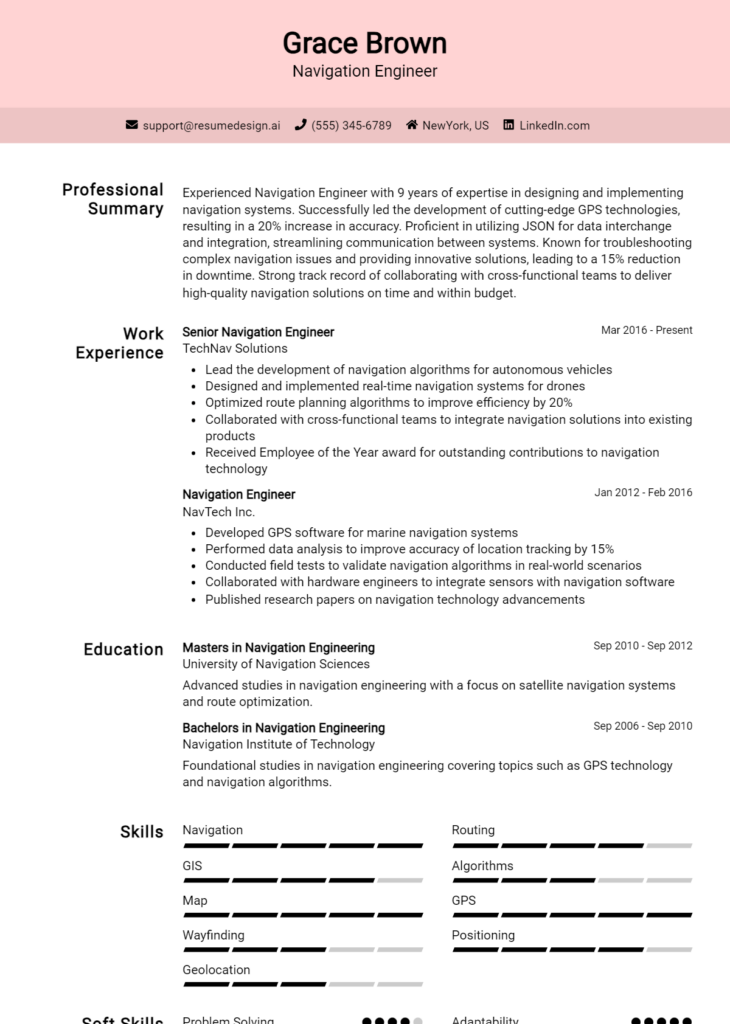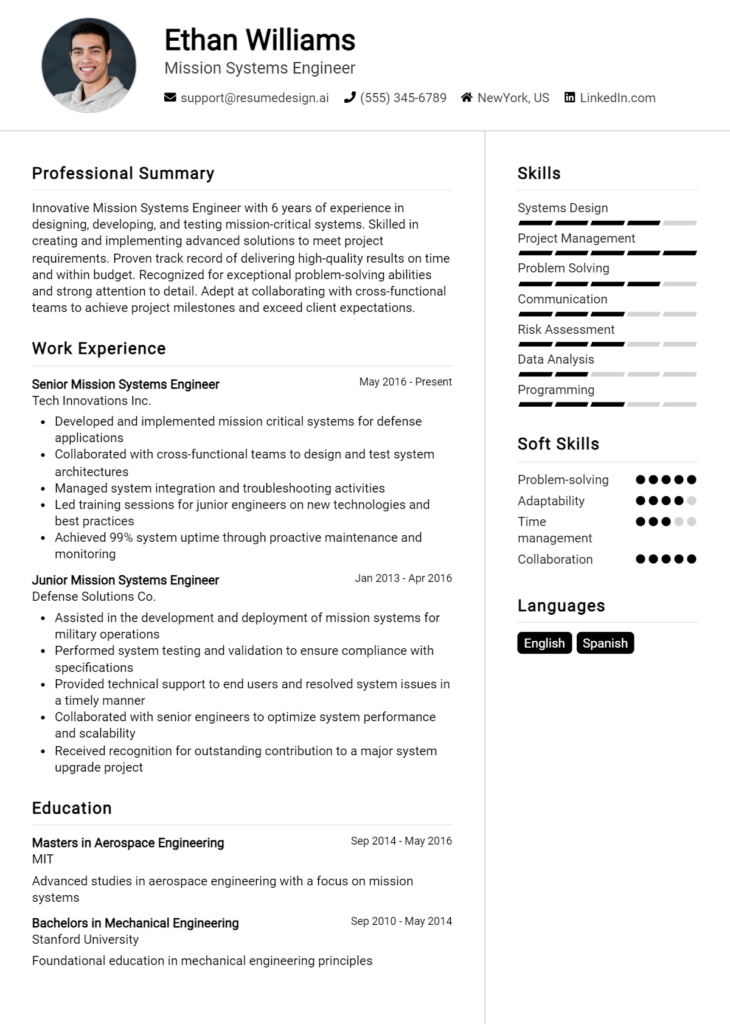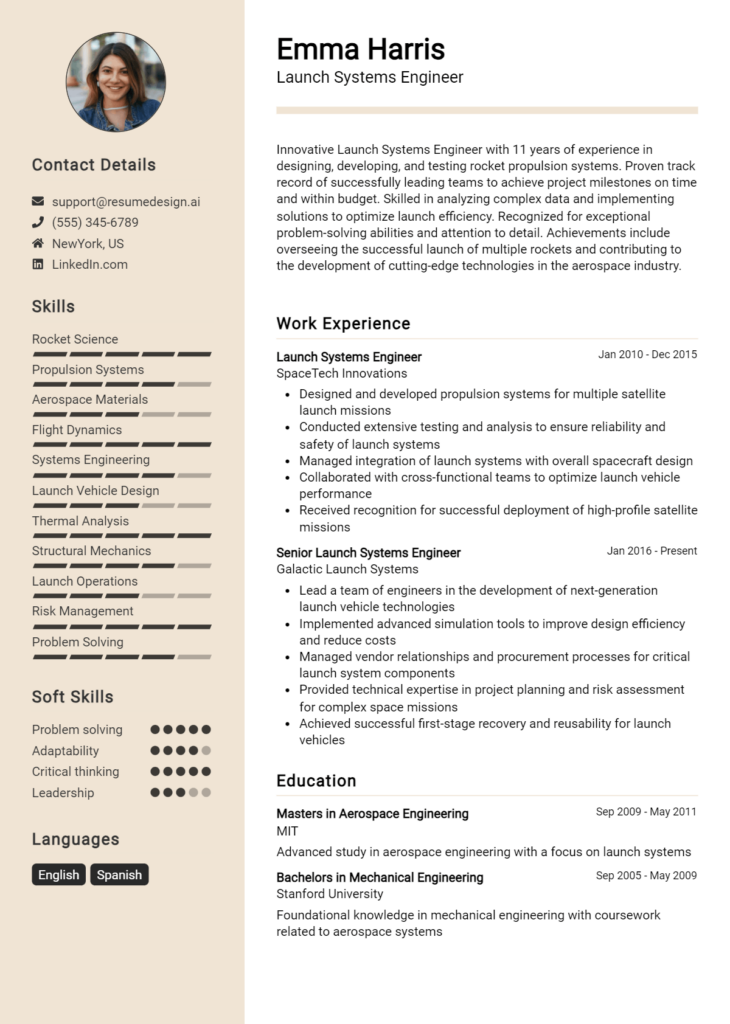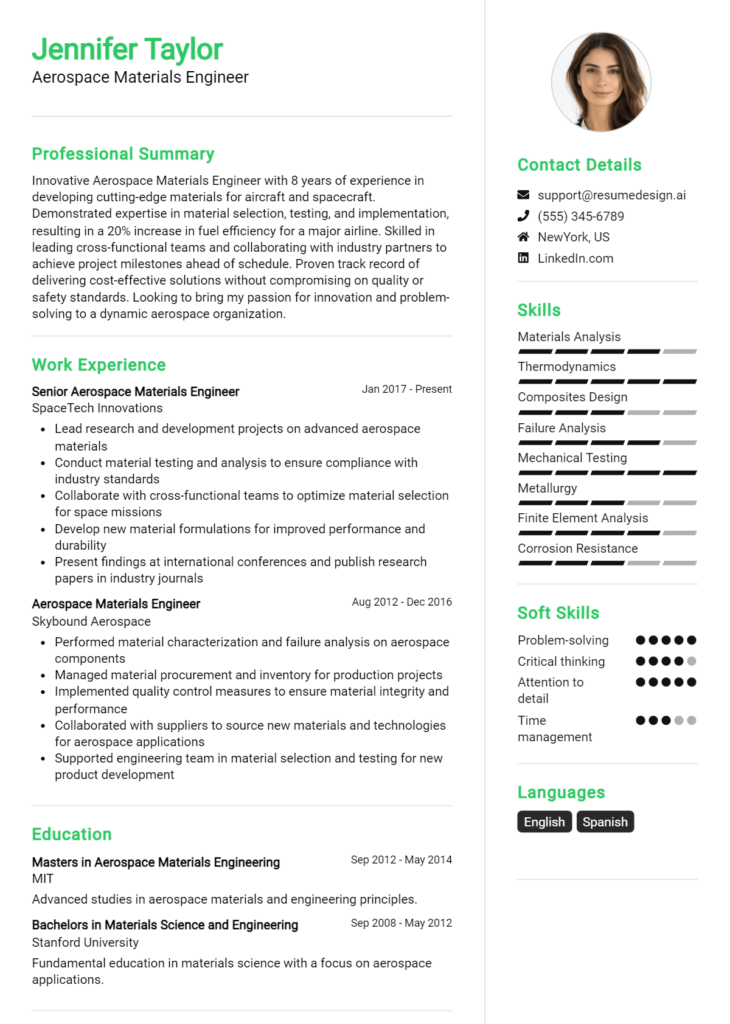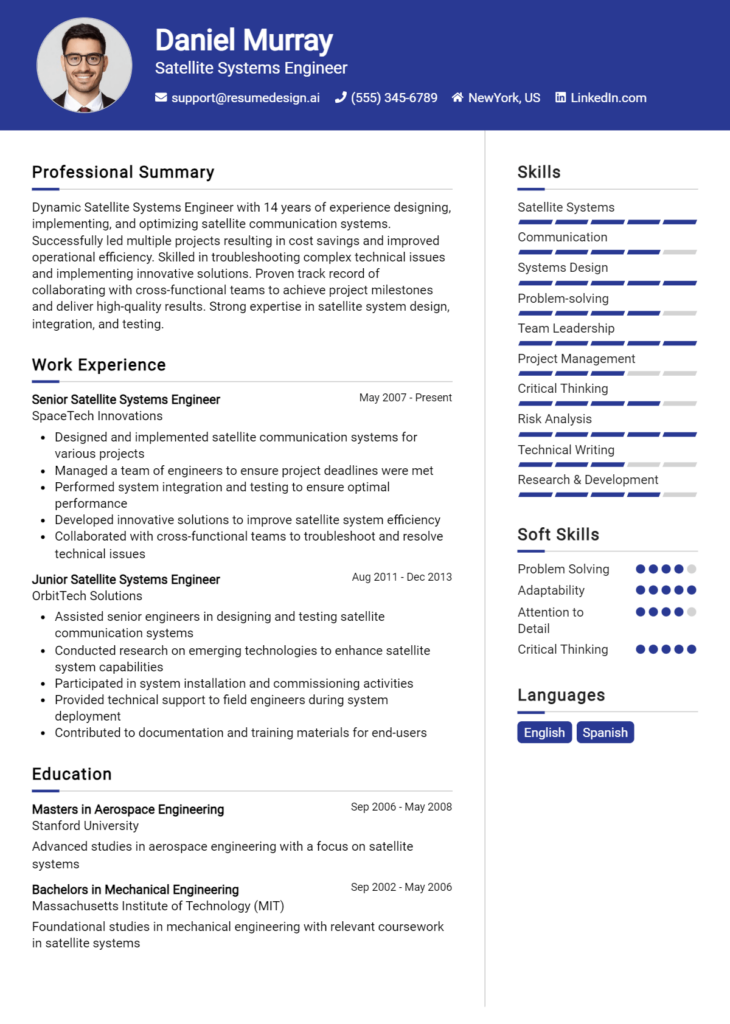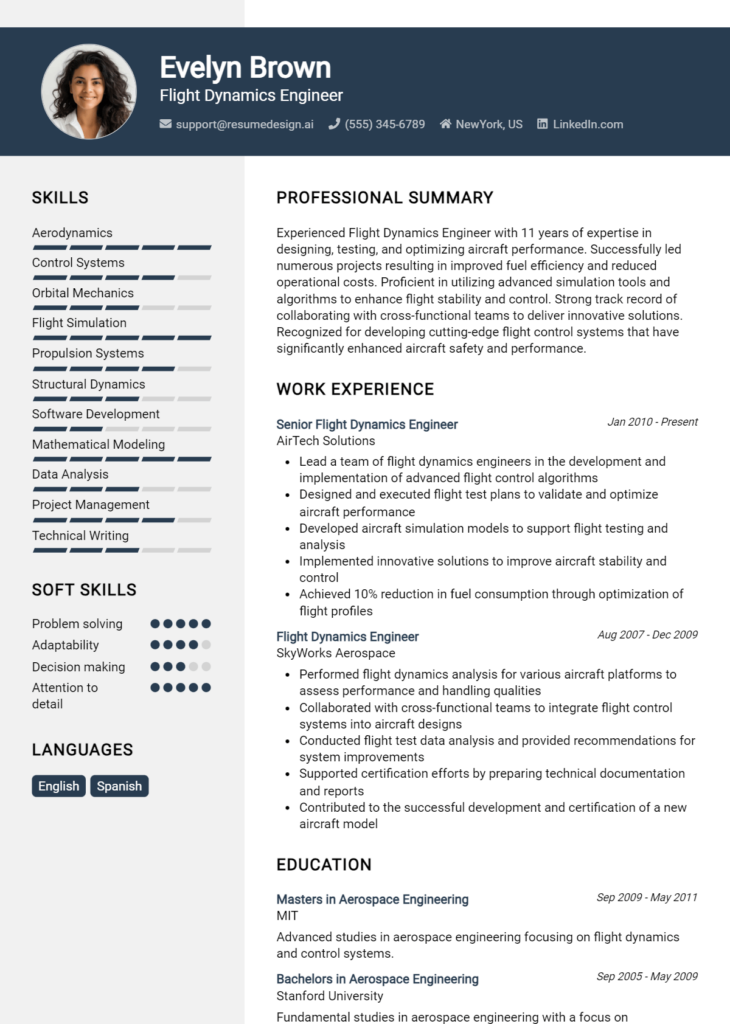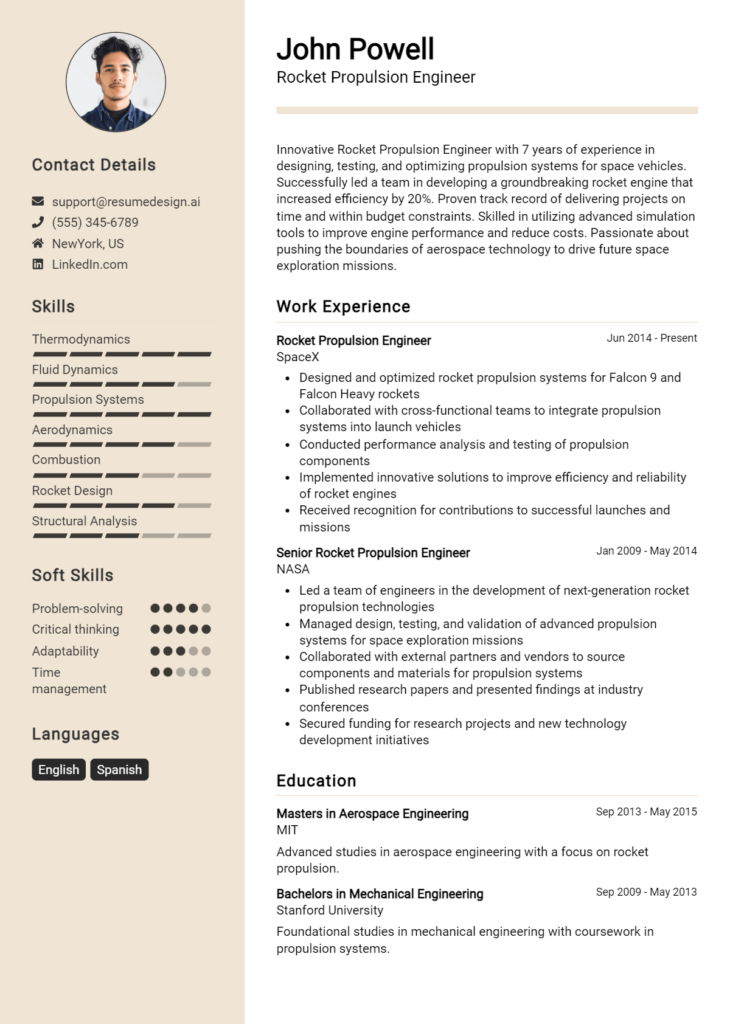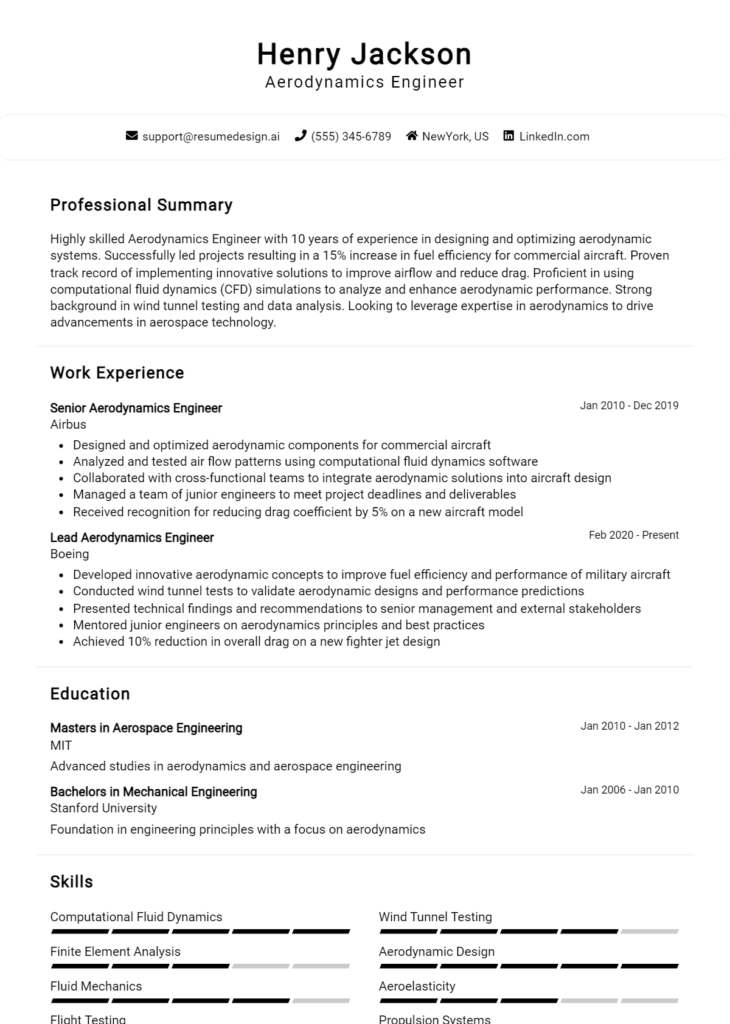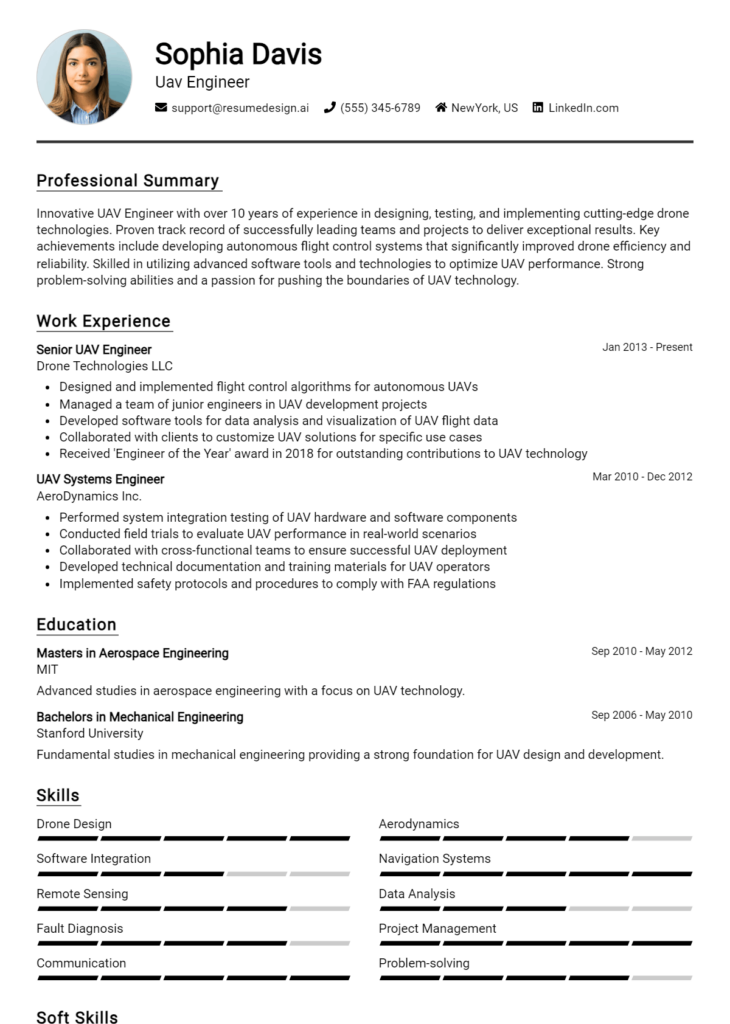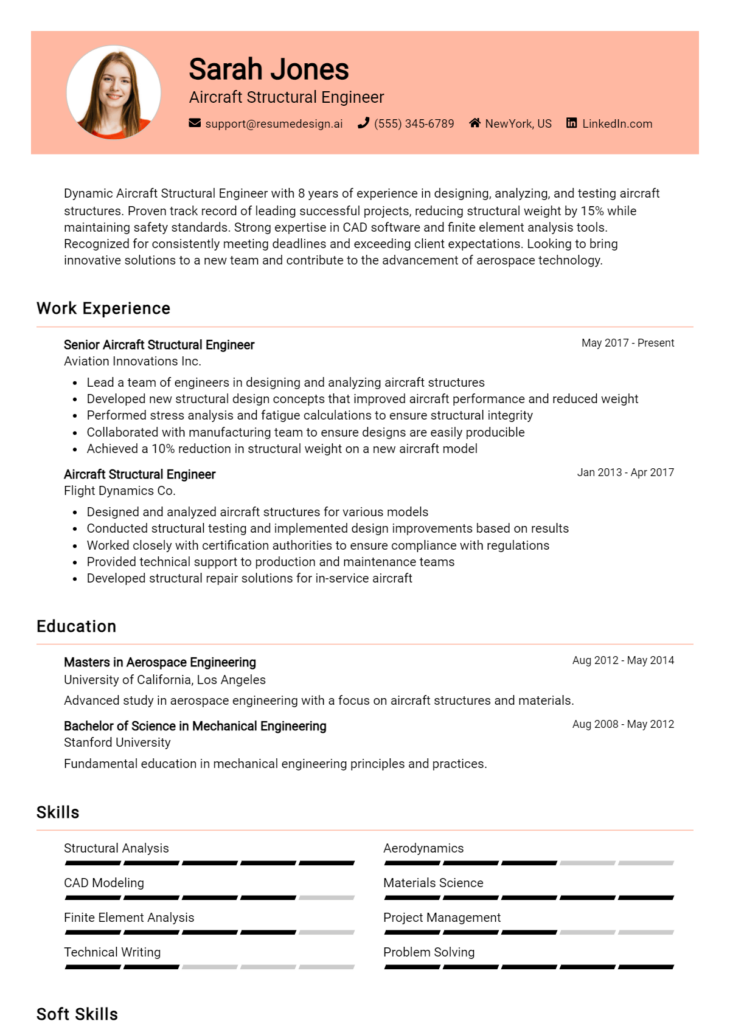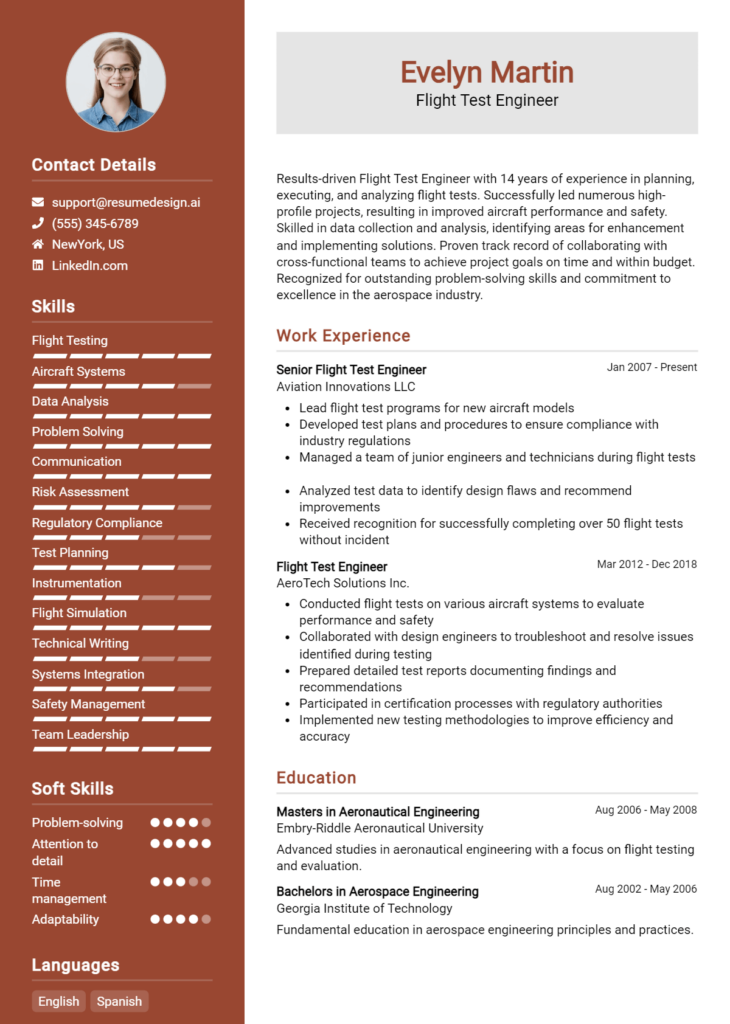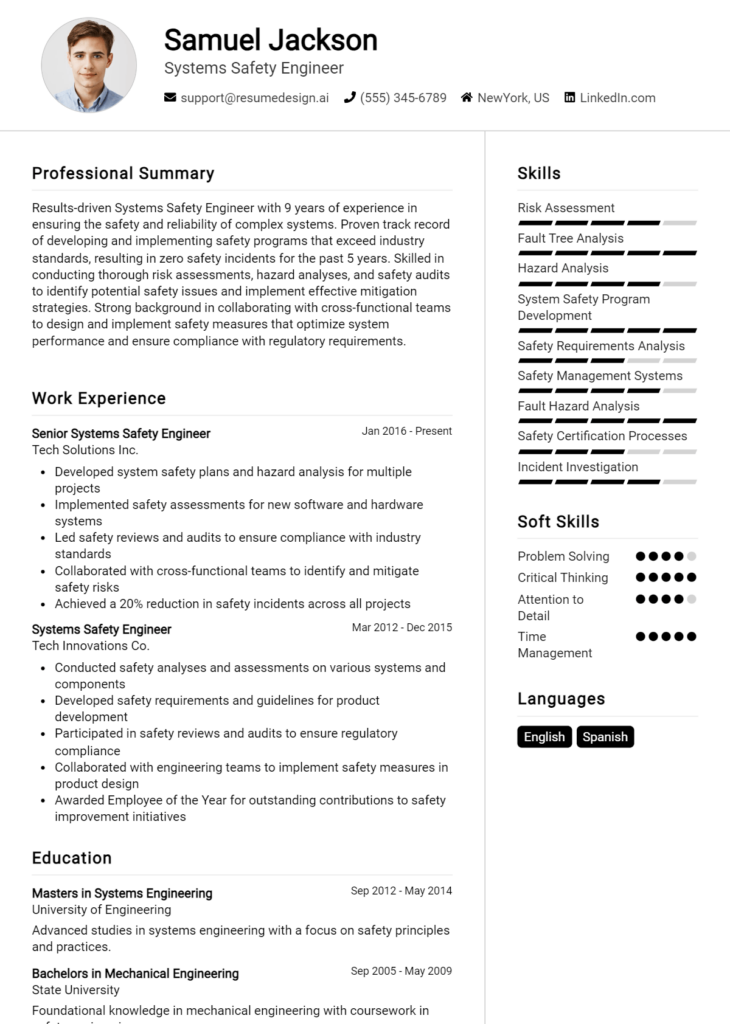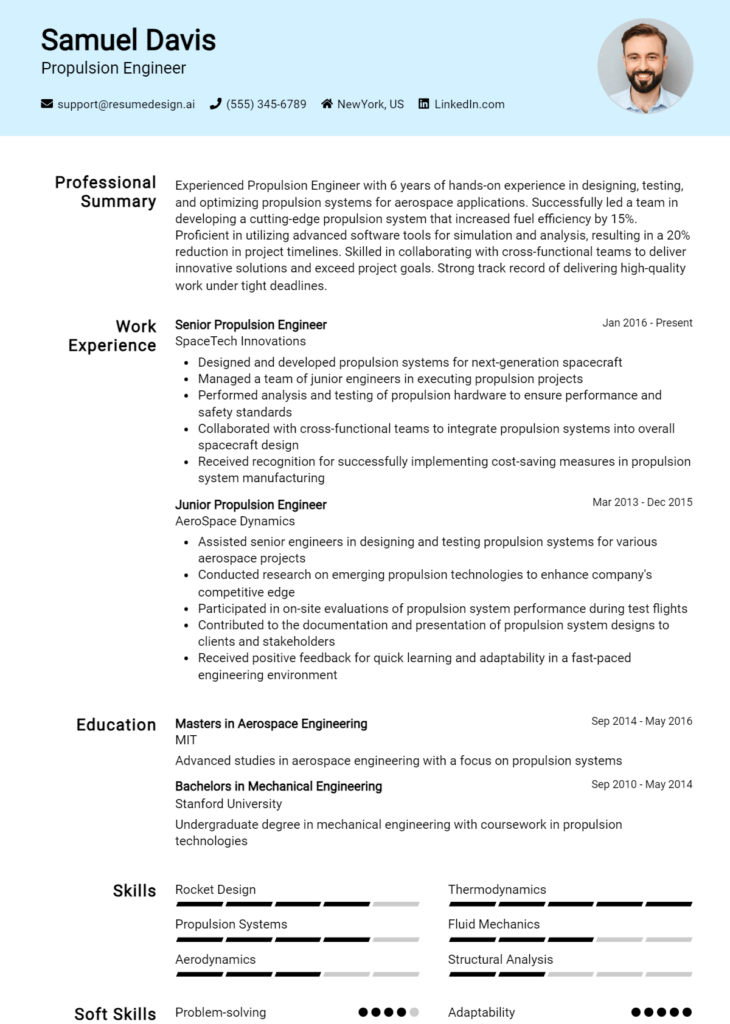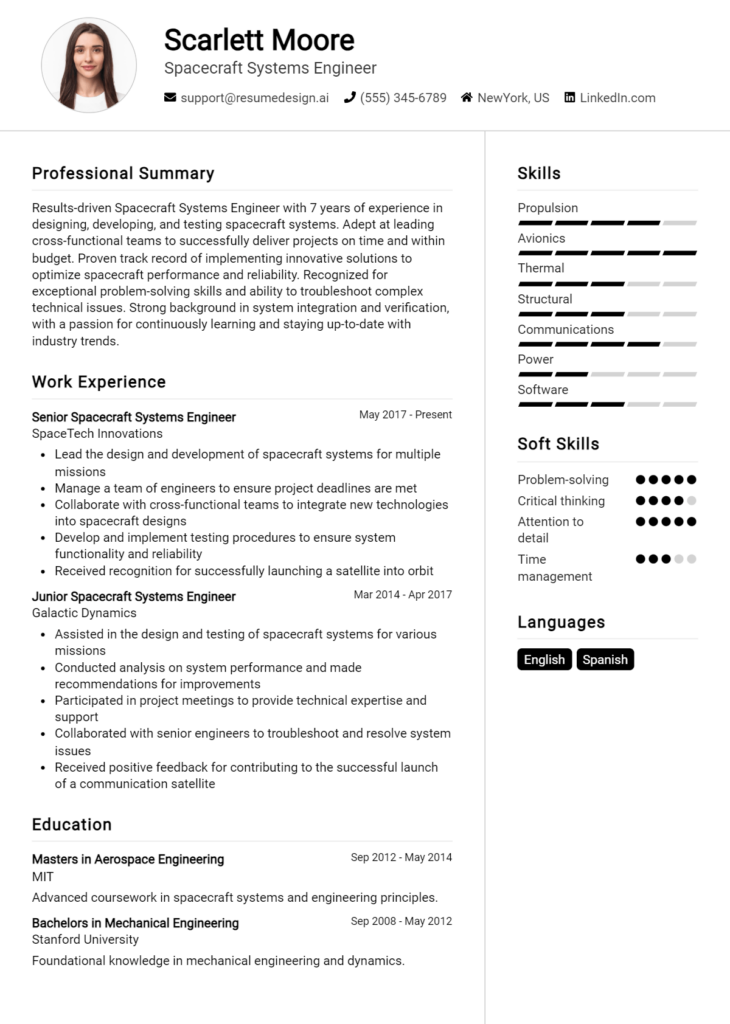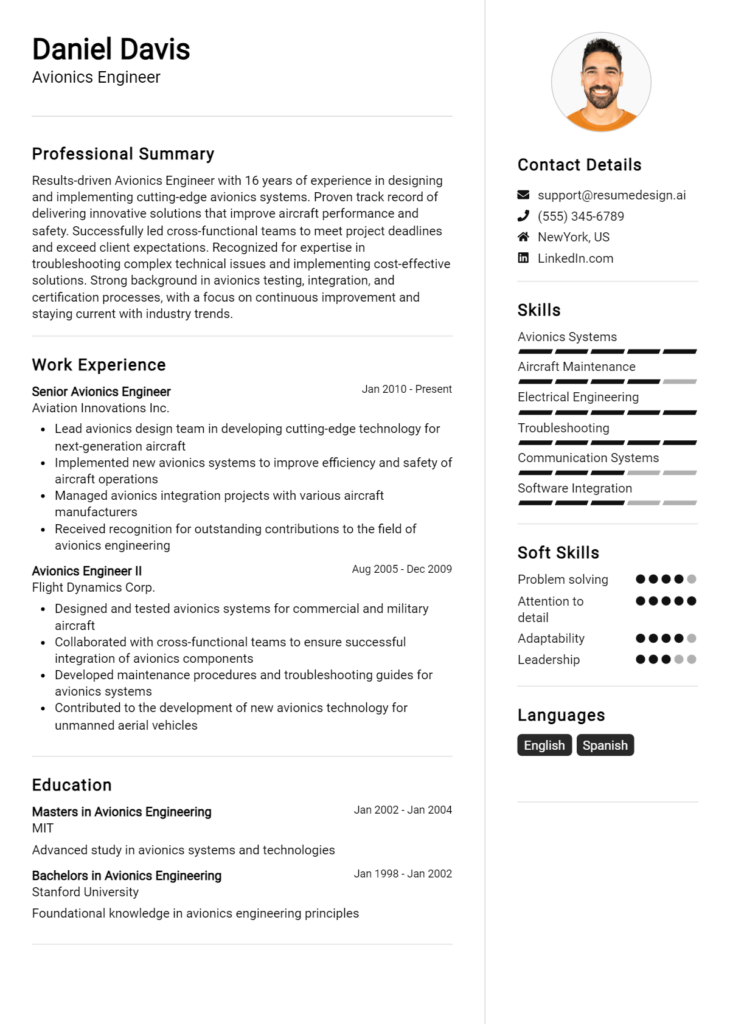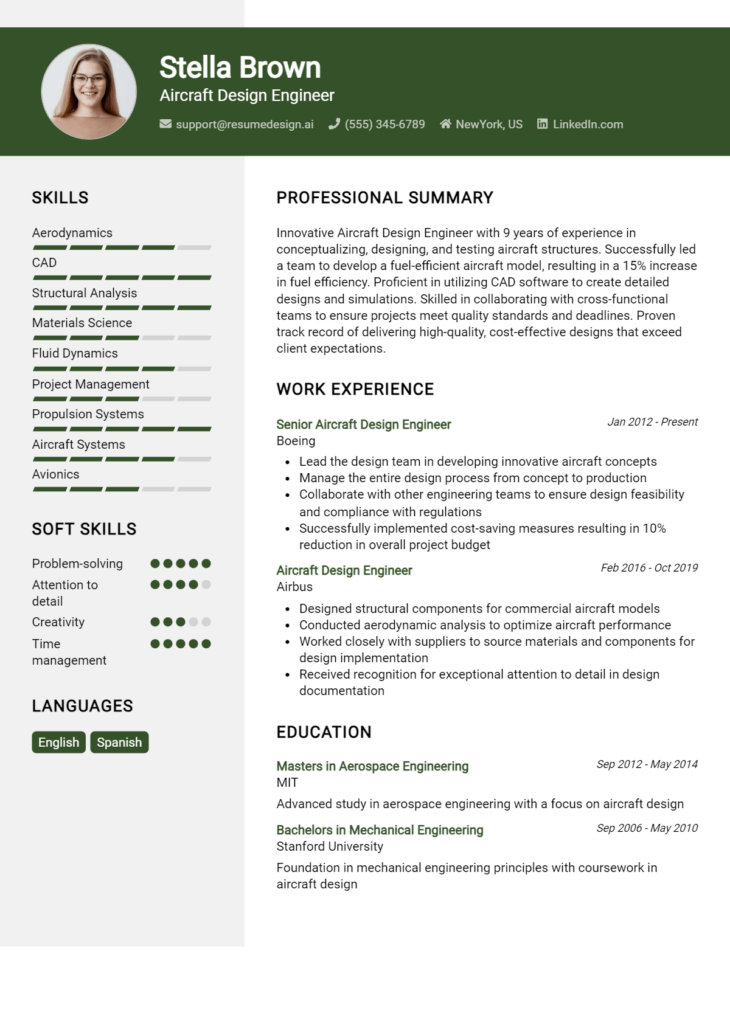Space Systems Engineer Core Responsibilities
A Space Systems Engineer plays a pivotal role in designing, developing, and integrating complex space systems. This position requires strong technical skills in engineering principles, operational knowledge of systems integration, and exceptional problem-solving abilities. The engineer collaborates across departments, ensuring that various functions—such as software, hardware, and mission operations—work cohesively. These competencies are essential for achieving the organization's objectives. A well-structured resume effectively highlights these qualifications, showcasing the engineer's capacity to contribute significantly to space missions.
Common Responsibilities Listed on Space Systems Engineer Resume
- Design and analyze spacecraft systems and subsystems.
- Develop and execute system requirements and specifications.
- Coordinate with cross-functional teams on system integration.
- Conduct performance assessments and risk analyses.
- Manage project timelines and deliverables.
- Implement testing protocols for space systems.
- Utilize software modeling tools for system design.
- Prepare technical documentation and reports.
- Support mission planning and operations.
- Identify and resolve technical issues during development.
- Participate in design reviews and stakeholder meetings.
- Ensure compliance with industry standards and regulations.
High-Level Resume Tips for Space Systems Engineer Professionals
In the competitive field of space exploration and technology, a well-crafted resume is essential for Space Systems Engineer professionals aiming to stand out to potential employers. Your resume often serves as the first impression you make, and it needs to effectively showcase your technical skills, relevant experience, and notable achievements. A strong resume not only highlights your qualifications but also tells a compelling story about your contributions to the aerospace industry. This guide will provide practical and actionable resume tips specifically tailored for Space Systems Engineer professionals, ensuring you present the best version of yourself to hiring managers.
Top Resume Tips for Space Systems Engineer Professionals
- Tailor your resume to match the specific job description, using keywords and phrases directly from the posting.
- Highlight relevant experience in space systems design, analysis, and project management to demonstrate your expertise.
- Quantify your achievements with metrics, such as project budgets, timelines, and performance improvements.
- Showcase industry-specific skills, such as proficiency in systems engineering processes and tools like MATLAB, Simulink, or CAD software.
- Include certifications and relevant training that enhance your qualifications, such as Systems Engineering Professional (SEP) or Project Management Professional (PMP).
- Utilize a clean and professional format that makes it easy for hiring managers to quickly find key information.
- Incorporate a summary statement at the top of your resume that encapsulates your career goals and key competencies.
- Showcase teamwork and collaboration experiences, as space projects often require cross-functional team efforts.
- Keep your resume concise, ideally one to two pages, focusing on the most relevant information for the position.
- Proofread your resume for errors, as attention to detail is crucial in engineering roles.
By implementing these tips, you can significantly enhance your chances of landing a job in the Space Systems Engineer field. A well-structured and targeted resume will not only display your qualifications but also convey your passion for aerospace innovation, making you a strong candidate in the eyes of potential employers.
Why Resume Headlines & Titles are Important for Space Systems Engineer
In the competitive field of aerospace engineering, particularly for a Space Systems Engineer, a well-crafted resume headline or title is crucial for standing out to hiring managers. A strong headline serves as a powerful first impression, succinctly summarizing a candidate's key qualifications and expertise in a single impactful phrase. It not only grabs attention but also effectively communicates the candidate's relevance to the specific role being applied for. By being concise and tailored, the headline can set the tone for the rest of the resume, making it essential for candidates to invest time in creating a compelling introduction to their professional experience.
Best Practices for Crafting Resume Headlines for Space Systems Engineer
- Keep it concise: Aim for 8-12 words that convey your core qualifications.
- Be role-specific: Tailor the headline to match the specific job title you are applying for.
- Highlight key strengths: Include your most relevant skills or achievements.
- Use action-oriented language: Choose strong verbs that demonstrate your impact.
- Avoid jargon: Ensure that the language is clear and understandable to all readers.
- Include relevant certifications: Mention any specialized training or certifications that enhance your qualifications.
- Showcase years of experience: If applicable, highlight extensive experience in the field.
- Maintain professionalism: Ensure the tone and style are suitable for the aerospace industry.
Example Resume Headlines for Space Systems Engineer
Strong Resume Headlines
"Experienced Space Systems Engineer Specializing in Satellite Design and Integration"
“Innovative Aerospace Engineer with 10 Years in Spacecraft Systems Development”
“Results-Driven Space Systems Engineer with Proven Success in Project Management”
“Dynamic Space Engineer with Expertise in Avionics and Systems Optimization”
Weak Resume Headlines
“Engineer Looking for a Job”
“Experienced Professional”
“Seeking Opportunities in Engineering”
The strong headlines presented are effective because they provide specific information about the candidate’s skills, experience, and areas of expertise, directly aligning with the expectations for a Space Systems Engineer. They convey the candidate's value proposition in a clear and compelling manner. In contrast, the weak headlines lack specificity and fail to communicate any unique qualifications or relevant experience, making them less memorable and impactful to hiring managers who sift through numerous resumes.
Writing an Exceptional Space Systems Engineer Resume Summary
A well-crafted resume summary is crucial for Space Systems Engineers as it serves as the first impression to hiring managers who often sift through numerous applications. A strong summary succinctly highlights a candidate's key skills, relevant experience, and noteworthy accomplishments, effectively showcasing their qualifications for the role. By capturing the essence of their professional journey in a few impactful sentences, candidates can grab the attention of recruiters and set the stage for the details that follow. It is essential that this summary is concise, tailored to the specific job at hand, and emphasizes the unique attributes that make the candidate a perfect fit for the position.
Best Practices for Writing a Space Systems Engineer Resume Summary
- Quantify Achievements: Use specific numbers or percentages to highlight your accomplishments.
- Focus on Relevant Skills: Emphasize technical skills and competencies that align with the job description.
- Tailor Your Summary: Customize your summary for each application to reflect the specific requirements of the role.
- Use Action Verbs: Start sentences with strong action verbs to convey impact and initiative.
- Keep it Concise: Aim for 3-5 sentences that encapsulate your professional identity without overwhelming the reader.
- Highlight Key Projects: Mention significant projects or systems you’ve worked on that showcase your expertise.
- Showcase Industry Knowledge: Reflect an understanding of current trends and technologies in space systems engineering.
- Maintain Professional Tone: Write in a formal, polished manner that reflects the seriousness of the engineering profession.
Example Space Systems Engineer Resume Summaries
Strong Resume Summaries
Results-driven Space Systems Engineer with over 8 years of experience in designing and testing satellite systems. Successfully led a team that reduced launch costs by 20% through innovative design modifications, ensuring on-time delivery of projects.
Detail-oriented engineer with a Master’s degree in Aerospace Engineering and expertise in systems integration. Developed a fault-tolerant communication system that improved data transmission reliability by 30%, contributing to mission success for three high-profile satellite launches.
Dynamic Space Systems Engineer skilled in propulsion and avionics, with a proven track record of managing multi-million dollar budgets and cross-functional teams. Spearheaded the development of a new satellite architecture that enhanced operational efficiency by 15%.
Weak Resume Summaries
Experienced engineer looking for opportunities in space systems. I have worked on various projects and have skills in engineering.
Motivated professional with a background in engineering. Interested in contributing to a team focused on space technology and exploration.
The strong summaries are effective because they provide quantifiable achievements, specific skills relevant to the role, and a clear demonstration of the candidate's impact in previous positions. In contrast, the weak summaries lack detail, specificity, and measurable outcomes, making them less compelling and memorable to hiring managers. By failing to articulate concrete contributions or skills, they do not effectively communicate the applicant's value or relevance to the role.
Work Experience Section for Space Systems Engineer Resume
The work experience section of a Space Systems Engineer resume is crucial as it serves as a reflection of the candidate's technical skills, leadership capabilities, and proven track record in delivering high-quality products. This section not only highlights the candidate's hands-on experience but also emphasizes their ability to manage teams and projects effectively. By quantifying achievements and aligning their experience with industry standards, candidates can demonstrate their value to potential employers and showcase their readiness to contribute to complex space missions and systems development.
Best Practices for Space Systems Engineer Work Experience
- Use quantifiable metrics to showcase achievements (e.g., improved efficiency by X% or reduced costs by $Y).
- Highlight experience with specific space systems, technologies, or methodologies relevant to the role.
- Demonstrate leadership and teamwork by detailing collaborative projects and your role in them.
- Tailor your work experience to match the job description and industry standards.
- Utilize action verbs to convey impact and initiative (e.g., designed, developed, led, implemented).
- Include relevant certifications or training that complement your work experience.
- Describe challenges faced in projects and how they were overcome to demonstrate problem-solving skills.
- Keep the descriptions concise, focusing on the most relevant and impressive aspects of your experience.
Example Work Experiences for Space Systems Engineer
Strong Experiences
- Led a cross-functional team in the design and integration of a satellite communication system, resulting in a 30% increase in data transmission efficiency.
- Managed a $5 million project for a spacecraft propulsion system, delivering the project two months ahead of schedule and under budget.
- Implemented innovative testing procedures that reduced system failure rates by 15%, significantly enhancing the reliability of space systems.
- Collaborated with aerospace engineers to develop a new thermal protection system, which improved mission sustainability by extending operational lifespan by 20%.
Weak Experiences
- Worked on various space-related projects with little detail on specific contributions.
- Assisted in team meetings to discuss project progress without outlining any measurable outcomes.
- Participated in system designs that were not implemented or resulted in no significant impact.
- Contributed to the development of space systems without clarifying individual responsibilities or achievements.
The examples of strong experiences illustrate a candidate's ability to achieve measurable results and effectively lead teams in complex projects, highlighting specific contributions and outcomes. In contrast, the weak experiences lack detail and quantifiable achievements, providing little insight into the candidate’s impact or role in projects. Strong experiences engage potential employers by showcasing relevant skills and successes, while weak experiences do not convey the candidate's potential value.
Education and Certifications Section for Space Systems Engineer Resume
The Education and Certifications section of a Space Systems Engineer resume is crucial as it provides a snapshot of the candidate's academic foundation and specialized knowledge relevant to the field. This section not only highlights the degrees obtained and the institutions attended but also showcases industry-relevant certifications and ongoing education efforts that demonstrate the candidate's commitment to continuous learning. Including relevant coursework, specialized training, and recognized credentials can significantly enhance the candidate's credibility and alignment with the specific requirements of the job role, making them a more attractive prospect to potential employers.
Best Practices for Space Systems Engineer Education and Certifications
- Prioritize relevance by listing degrees and certifications that directly pertain to space systems engineering.
- Include detailed information such as the name of the institution, degree obtained, and graduation dates.
- Highlight advanced or industry-recognized credentials, such as Certified Systems Engineering Professional (CSEP) or Project Management Professional (PMP).
- Incorporate relevant coursework that showcases specialized knowledge or skills applicable to the role.
- List any continuing education or professional development courses that demonstrate a commitment to staying updated in the field.
- Use bullet points for clarity and easy reading, ensuring that each point is concise yet informative.
- Consider including honors, awards, or recognitions received during your education to further enhance credibility.
- Keep the section organized and visually appealing, ensuring it integrates well with the overall resume layout.
Example Education and Certifications for Space Systems Engineer
Strong Examples
- M.S. in Aerospace Engineering, Massachusetts Institute of Technology, 2022
- Certified Systems Engineering Professional (CSEP), INCOSE, 2023
- Relevant Coursework: Satellite Systems Design, Astrodynamics, and Space Mission Analysis
- B.S. in Mechanical Engineering, Stanford University, 2020
Weak Examples
- B.A. in English Literature, University of California, 2015
- Certification in Basic Computer Skills, 2018
- Relevant Coursework: Introduction to Psychology
- High School Diploma, Somewhere High School, 2012
The examples listed as strong are directly relevant to the field of space systems engineering, showcasing advanced degrees and certifications that align with industry expectations. They include specific coursework that highlights specialized knowledge necessary for the role. In contrast, the weak examples reflect qualifications that do not pertain to the engineering field, such as unrelated degrees and outdated certifications. These weak qualifications do not demonstrate the necessary expertise or commitment to continuous learning that employers seek in a Space Systems Engineer.
Top Skills & Keywords for Space Systems Engineer Resume
In the competitive field of space exploration and satellite technology, a well-crafted resume for a Space Systems Engineer must highlight a diverse array of skills that demonstrate both technical expertise and interpersonal capabilities. Skills play a crucial role in showcasing a candidate's qualifications and their ability to contribute effectively to projects involving complex space systems. A strong resume not only reflects an engineer's technical proficiency but also emphasizes their capacity to work collaboratively in multidisciplinary teams, manage intricate projects, and innovate in a rapidly evolving industry. To enhance your resume, it is essential to include a balanced mix of hard and soft skills that align with the demands of the role.
Top Hard & Soft Skills for Space Systems Engineer
Soft Skills
- Problem-solving
- Team collaboration
- Effective communication
- Critical thinking
- Adaptability
- Time management
- Leadership
- Attention to detail
- Creativity
- Conflict resolution
- Decision-making
- Interpersonal skills
Hard Skills
- Systems engineering principles
- Software development (e.g., C++, Python)
- Satellite design and analysis
- Orbital mechanics
- Model-based systems engineering (MBSE)
- Requirements management
- Simulation and modeling tools (e.g., MATLAB, Simulink)
- Electrical and electronic systems knowledge
- Testing and validation processes
- Project management methodologies (e.g., Agile, Waterfall)
- Ground segment operations
- Spacecraft navigation and control
- RF and communication systems
- Data analysis and interpretation
- Quality assurance and control
Incorporating these skills into your resume can significantly boost your marketability as a Space Systems Engineer. Additionally, showcasing relevant work experience that complements these skills will provide a comprehensive view of your capabilities to potential employers.
Stand Out with a Winning Space Systems Engineer Cover Letter
Dear [Hiring Manager's Name],
I am excited to apply for the Space Systems Engineer position at [Company Name], as advertised on [Job Board/Company Website]. With a Master’s degree in Aerospace Engineering and over five years of experience in designing, developing, and testing space systems, I am confident in my ability to contribute to your team's innovative projects. My background includes working on satellite communications systems and propulsion design, which has equipped me with a robust understanding of the complexities involved in space missions.
In my previous role at [Previous Company Name], I led a multidisciplinary team to successfully design and launch a small satellite for Earth observation. This project honed my skills in systems engineering principles, including requirements definition, risk management, and verification and validation processes. My ability to collaborate with cross-functional teams ensured that all aspects of the project were aligned with our objectives, resulting in a successful launch ahead of schedule and under budget. I am particularly drawn to [Company Name] due to your commitment to advancing space exploration through innovative technology and sustainability.
I am adept at utilizing advanced modeling and simulation tools, such as MATLAB and STK, to analyze system performance and make data-driven decisions. Additionally, my hands-on experience with hardware-in-the-loop testing has reinforced my ability to translate theoretical designs into practical applications. I am eager to apply my technical expertise and problem-solving skills to tackle the challenges faced by [Company Name] in developing cutting-edge space systems.
I am thrilled at the prospect of joining [Company Name] and contributing to your mission of pioneering advancements in space technology. Thank you for considering my application. I look forward to the opportunity to discuss how my background and skills align with the needs of your team.
Sincerely,
[Your Name]
[Your Contact Information]
Common Mistakes to Avoid in a Space Systems Engineer Resume
When crafting a resume for a Space Systems Engineer position, it’s crucial to present your skills and experiences effectively. However, many candidates make common mistakes that can hinder their chances of landing an interview. Understanding these pitfalls can help you create a more compelling resume that showcases your qualifications. Here are some frequent mistakes to avoid:
Generic Objective Statements: Using a one-size-fits-all objective can make your resume blend in with others. Tailor it to reflect your specific interest in space systems engineering and how you can contribute to the organization.
Overly Technical Language: While it’s important to demonstrate your technical expertise, excessive jargon can alienate hiring managers. Aim for clarity by explaining complex concepts in a way that is accessible to a broader audience.
Lack of Quantifiable Achievements: Failing to include measurable results can diminish the impact of your accomplishments. Use metrics to highlight your contributions, such as the percentage by which you improved a process or the size of the team you led.
Neglecting Relevant Experiences: Omitting relevant internships or projects can weaken your application. Be sure to include all pertinent experiences, even if they were academic or voluntary, to showcase your commitment to the field.
Inconsistent Formatting: A resume that lacks uniformity in fonts, bullet points, and spacing can appear unprofessional. Maintain a consistent format throughout to enhance readability and create a polished look.
Ignoring Soft Skills: While technical skills are critical for a Space Systems Engineer, soft skills like teamwork and communication are equally important. Highlight these abilities to show that you can collaborate effectively in multidisciplinary teams.
Too Lengthy or Too Short: A resume that is too long may overwhelm recruiters, while one that is too short may not provide enough information. Aim for a concise document that effectively summarizes your qualifications, ideally one to two pages.
Neglecting Proofreading: Spelling and grammatical errors can undermine your professionalism. Carefully proofread your resume to eliminate mistakes and consider asking a colleague to review it for clarity and accuracy.
Conclusion
As we explored the multifaceted role of Space Systems Engineers, it became clear that this profession demands a unique blend of technical expertise, problem-solving skills, and a deep understanding of systems integration. Key responsibilities include designing, testing, and overseeing the development of space systems, collaborating with multidisciplinary teams, and ensuring that projects meet stringent safety and regulatory standards.
In addition to technical skills, strong communication abilities are essential for effectively conveying complex concepts to stakeholders. The evolving landscape of space exploration, driven by advancements in technology and increased private-sector involvement, offers exciting opportunities for professionals in this field.
As you reflect on the insights shared, it’s crucial to ensure that your resume effectively highlights your qualifications and experience relevant to the Space Systems Engineer role. Take action today by reviewing your resume and considering how well it represents your skills in this dynamic field.
To assist you in this endeavor, numerous resources are available to enhance your application materials. Explore our resume templates to find designs that suit your style, utilize our resume builder for a user-friendly experience in crafting your resume, and check out resume examples for inspiration tailored specifically to engineering roles. Additionally, don’t forget to enhance your job application with a standout cover letter using our cover letter templates.
Your next opportunity in the exciting world of space systems engineering is just a well-crafted resume away!

